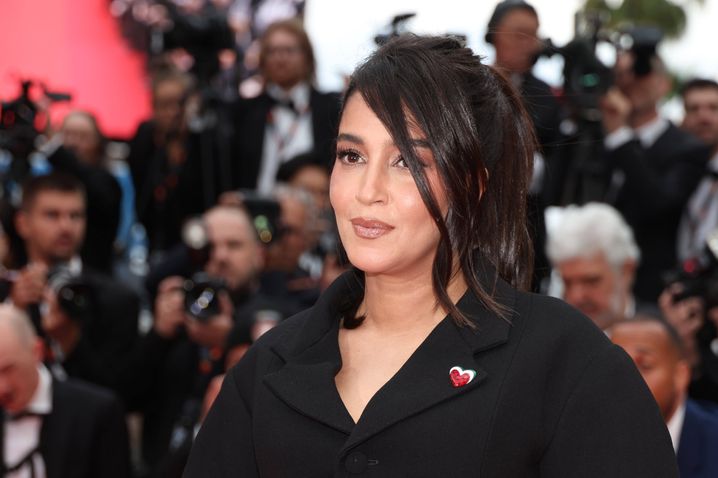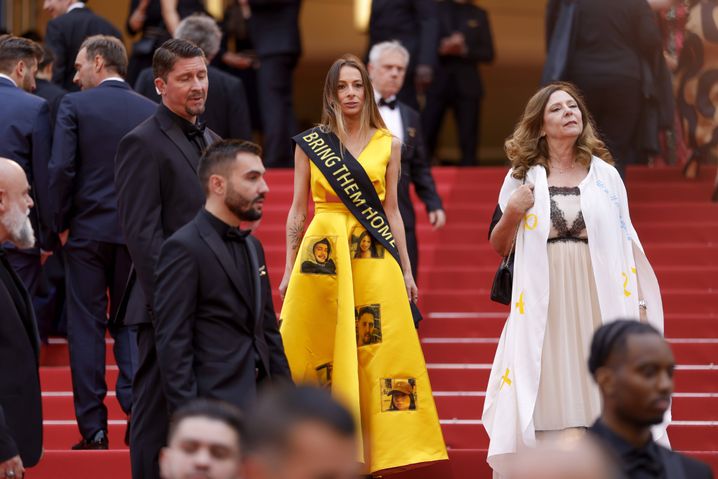It only took a few seconds for a simple gala outfit to turn into a political message. Monday, during the climb of the steps before the screening of the film The Apprentice At Cannes film festival, all eyes were on Cate Blanchett, who came to attend the premiere. Or on her dress, more precisely.
By delicately lifting one of the sides of her garment, the actress revealed the green fabric of her lapel, until then imperceptible. Associated with the pinkish black and white of her look, as well as the famous red of the carpet, the set of colors quickly evoked the colors of Palestine.
Support for the Gazan people or a banal coincidence? If the person concerned did not bring any significance to this sartorial twist, her dress instantly took on a strong symbolic significance. A subtle way of bringing politics into the fabrics of the Croisette?
Embroidery, noose and “symbolic gestures”
Cate Blanchett would not be the first to “textilely” deliver a message on a red carpet. During the Oscars in 2020, Natalie Portman wore a Dior cape, on which the names of forgotten female filmmakers from the ceremony were embroidered. The following year, at the Met Gala in New York, Democrat Alexandria Ocasio-Cortez stood out in a much more explicit way by wearing a white dress with “Tax the rich” written in red.
For Mélody Thomas, fashion journalist and author of the book Fashion is political: A brief inclusive lexicon (ed. Les Insolentes), these numerous occurrences demonstrate “the place that fashion occupies in conversations today. Everyone feels concerned by what is happening there. And a festival like Cannes, through its international influence, will also allow or give the desire to certain personalities to express their political commitments. »
On the Cannes red carpet, in 2023, Iranian model Mahlagha Jaberi wore a dress with a rope at the neck. A way “to draw media attention to the unjustified executions of the Iranian people,” she explained, reported miss. She said: “Unfortunately, political statements are not allowed at the film festival and security prevented me from showing the back of my dress, but the meaning of the ‘noose’ was understood. »
Delivering a message through your look, a clever way for personalities to circumvent the rules? If distinctive signs such as elected officials’ scarves seem prohibited on the red carpet, what about the wearing of flags or signs relating to a commitment or politics? Questioned on this point by 20 minutesthe festival’s communications department did not respond to our requests.
In the case of Cate Blanchett, “she perhaps told herself that she was maximizing her chances of not having problems,” analyzes journalist Mélody Thomas. When we see the dress as it is, we cannot guess the symbol it hides. It’s only when she arrives on the red carpet and makes this hand gesture that we see that the colors reconstitute the Palestinian flag. It is the gestures that create the symbol. »
A politicization of clothing
If Cate Blanchett did not speak out on this dress, she has already spoken out on the Israeli-Palestinian conflict. In November, a month after the October 7 attack, as ambassador of the United Nations High Commissioner for Refugees (UNHCR), she called in the European Parliament for an “immediate humanitarian ceasefire” in the Gaza Strip, recalls Release. It is therefore not surprising that her outfit on the red carpet could be interpreted as an extension of her speech.
“Clothing has always been a tool through which to convey messages,” explains journalist Mélody Thomas. The question of the politicization of clothing refers to the positioning of the individual himself. It’s the whole question of clothing that reflects who we are and what our values are. »
In Cannes this year, another personality did not hesitate to slip a message into her outfit. Immortalized by photographers before the premiere of Furiosa last week, a small badge pinned to Leïla Bekhti’s dress did not go unnoticed: a pin in the shape of a heart and a watermelon. A symbol “of Palestinian resistance since the Six Day War” in 1967, explains the site of the Parisian.

Furthermore, Leïla Bekhti had already spoken out on several occasions regarding the situation in the Middle East, on social networks, or by engaging with Unicef in April to raise awareness about the fate of children in the Gaza Strip. , reported Humanity.
“Visible commitments”
Other voices were raised during this 2024 edition of the Cannes Film Festival. Invited to climb the steps, Laura Blajman-Kadar, survivor of the October 7 terrorist attack in Israel, wore a yellow dress in support of the hostages, on which portraits of missing people were sewn. She also wore a large scarf with the inscription “Bring them home”.

On a completely different subject, a “Make America Great Again” cap (the political slogan of Donald Trump) sat on the head of one of the guests on the red carpet before the screening of the film Marcello Mio, on May 21. A sartorial stance that could become more pronounced in the months to come.
“In many Western countries, we are going to enter very strong electoral periods and people will want to make visible commitments,” says author Mélody Thomas. We must expect that these debates will take place outside the framework in which we usually see them, including in red carpet ceremonies. »

